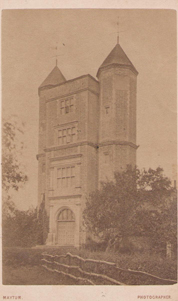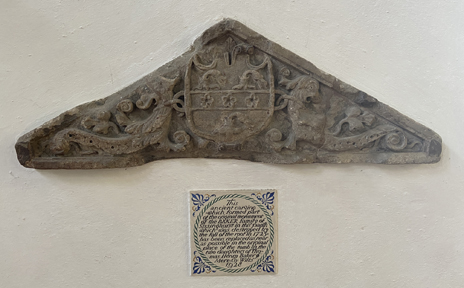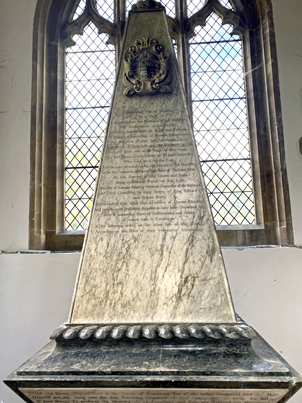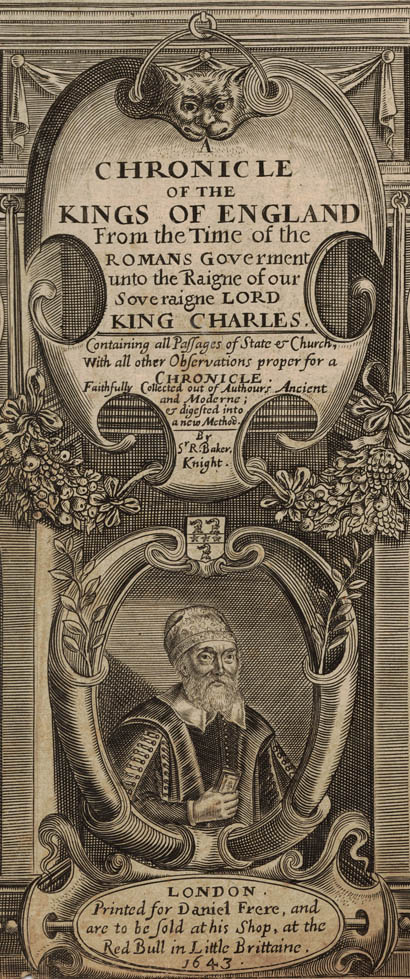Letter to Hugh C. Baker from His Uncle Lt. Col. G.P. Baker, 1842
Searching for our ancestors, as shown in this historical 1842 letter, is not a new phenomenon. In addition to addressing the family genealogy, the letter also presents a clear picture of Sissinghurst Castle as it was pre-1842. The beauty of the letter, though, lies in the style of the writer himself: descriptive, grammatically precise, with just a touch of the dry British humour. The age old complaints of taxes, weather and the stock market are addressed and comments are made about conceptions held about conditions in the New World.
See the Baker family page of this website for the lineage of Lt. Col. G.P. Baker.
Orleans 19 July 1842 New York Ship Aug. 15 Toronto 19 Aug.,1842
Mr. Hugh Cossart Baker, Bank of the People, Toronto, Canada
via Le Havre and New York
My dear Hugh:
I was this morning favoured with your letter of the 18 April for which I have little to offer but my best thanks. You will observe it has taken a long time to come, full as long as if it had come from Calcutta.
I am not able to give you any information on the subject you mention, of our family, for two excellent reasons:
1. That I know nothing of it, except by tradition, that we are descended from a family of the same name, long seated at Sizinghurst Castle in Kent.
Photograph by Alfred R Maytum, Ashford, Kent.
2. That when I visited that place some years since, all I could do was to visit the ruins of the castle, and the family monument in Cranbrook Church, their parish; of both which I obtained large drawings, done by the Parish Clerk's son, which are now with all my baggage in England, my trip had no other result, except the saving of a broken stone with the family arms carved thereon, apparently about Queen Elizabeth's time, when the family appears to have been at the height of its grandeur, and which seemed to have been the architrave of a window. This I obtained leave of the vicar to have put up over the Church entrance, with some other ancient sculptures.
Found in the ruins of Sissinghurst, an Architrave of one of the windows, which was put over the entrance to the Church
At St. Dunstan's Parish Church, Cranbrook, Kent.
Plaque under the Architrave reads, "This ancient carving - which formed part of the original monument of the BAKER family of Sissinghurst in this parish which was destroyed by the fall of the roof in 1725- has been replaced as near as possible in the original place of the tomb by the two daughters of Thomas Henry Baker of Mere. Co: Wilts 1928"Baker Monument at St. Dunstan's Parish church, Cranbrook, Kent
The main stock of the family seems to have ended in four daughters, co-heiresses, who, marrying different gentlemen, the Estate was sold and thus went out of the family. It now belongs to the Earl Cornwallis. The castle is a ruin, except the principal gate, supported by two hexagon or octagon towers in 3 stages and roofless; and the stables and kennels now are devoted to the purpose of a Parish Workhouse. It was once very extensive and surrounded by a moat; during the Seven Years War it contained 3,000 French prisoners--one of whom made the grotesque sketch of which I obtained a copy. There is also a print of it in Halsted's Kent; but at that time it belonged to a family named Perham or Barham. It is in a melancholy, low, uninteresting site; but the lands are amongst the very richest in England, and furnish the finest hops in Kent. The family, by a book I saw, possessed 9 or 11 other manors in Kent, at Hawkhurst, Lamberhurst, etc., etc., One, a very old man in the Workhouse, said he remembered the last of the family coming to Church every Sunday with their guests and visitors in four coaches and four horses, long tails, etc., etc., but I strongly suspect that this was mere tradition, or the love of the marvelous so common even to those above the lower orders; for the inscription on the monument about 130 years old, states the family to have ended in four females, excepting of course the collaterals, from some of whom we may be descended. It is most probable that the Lismacue family, being the chief of our Irish branch, i.e., the head of that from which we are unquestionably sprung, have some more certain indications concerning our common ancestry--but it is essential to mention that there are several other families of the same name, seated in different parts of Kent, and on both sides of the Medway, i.e., either Men of Kent or Kentish men. The former had the privilege of guarding the King's person when he went to battle. The last time the privilege was claimed and exercised was when William III went to expel James II from Ireland, when I have understood our ancestor commanded 100 men at arms who accompanied the former, and for his services obtained the forfeited Estate of Lismacue in Tipperary, which in reality belongs to some Celtic O'Hagerty or O'Shaughnessey. I have heard there is a painting in the hall at Lismacue, representing the Battle of the Boyne, and our Ancestor, selon les règles at the King's right hand, and close to the celebrated Marshall Duke of Schomberg, in the middle of the river, at the moment the latter receives his death wound from a cannon shot. To tell the truth, however, a family named Frith, now settled in County Kerry, claim the very same honour and privilege, of having commanded the Men of Kent with the Dutchman; and of course, of having been placed in the very same spot in the Battle of the Boyne where our ancestor is represented in our painting; and what is more, they have their painting also representing the same event. For aught I know to the contrary, the paintings thus intended to represent one historical fact, may have been drawn by the selfsame artist. Until your historical researches succeed in finding an authentic muster roll of King William's forces, and especially of his body guard, the Men of Kent, at the Battle of the Boyne, I see not how the real state of the case can be satisfactorily established. But Col. W. H. I. Frith of the Bengal Artillery, from whom I have the story, is one of my oldest and most valued friends. I was once in correspondence with a surgeon Baker of the 10 Light Cavalry in Bengal, also from Kent, but across the Medway--but his Arms were totally different from ours. There is a very old and respectable family, same name, settled in Canterbury (of which one was the Minister 30 or so years ago) but of them I know zero. There are several families of note, same name, in other counties in England. One, Sir Frederic, I met years back at the Atheneum Club, but on comparing seals, our families were quite distinct. He was a Devonshire Bar't. Then there is now a very wealthy old lady, same name, with a splendid seat in Essex and a fine house in Portland Place to whom I sincerely wish you could prove your title to inherit her Estate, and as the Irishman says "That's all the harm I wish you, sure!"
18 June--We have had three weeks of intense heat, for Europe. The thermometer has fluctuated daily from 80 to 90 in the shade--but a smart shower and thunderstorm recently has moderated the weather, and enables me to resume the pen when not interrupted by preparations for our removal. We are now in Treaty for a larger house in another part of the town at a rent certainly higher than would be paid for such a house in any provincial town in England, viz. £52 per annum, but then the taxes are lower -- only from £2 to £3 -- that on the land or house as fixed property, being paid by the landlord though of course included in my rent. I have long wished we could settle in England, at least in any part of the three kingdoms; but as all are against me, and some of their reasons are undeniable, though I still think the balance is the other way, yet as a temporary expedient the discussion has ended in favor of the three to one. Such a house or even better I could get in most parts of England for £40; but then the taxes!!! My lease is for 3, 6, or 9 years as usual, but in case of war appearing probable or imminent, I have the power to break the lease on a month's notice, paying 6 months rent as indemnity. Such is the clause I have proposed for really there is no saying how long peace is to exist, seeing the effervescence in France for the last two years, or ever since it was proved to them that their will was not to form the Common Law of all Europe! If M. Cherrier or his Notary agree to my terms, we shall remove by the 23. Indeed we must go somewhere by that day, as my lease expires and the house we occupy is to undergo complete alterations and repair.
I forgot to add to our family notices that Sir Richard Baker, Knt., was a well known historian. His Chronicle is quoted, I believe, by Hume, and by all English historians. His name is inscribed on the family monument; but I have heard he died in a workhouse, or in the deepest distress, and was buried in St. Brides' Church, London, at the expense of the Parish. Indeed, I think I read this in some printed accounts of Kent, but on going to St. Brides I could find no trace of this personage from a very rude and uncivil clerk or sexton I met there. What notices I gleaned in Kent of our family, I am pretty certain I sent to your father at the time. The drawings are now in my baggage at Brighton, where I regret to say I have 22 packages in a warehouse, some of them monstrously large, particularly one chest which I have christened Noah's Ark.
Don't make any apology for your writing, which is far superior to mine. I never can now get or make a decent pen, for my failing sight prevents my making them as I used to do. Your paper appears to be greasy, and I am happy for the reason just mentioned you did not cross your writing, for if you had, I must have had one of the girls decipher it. As to our crossing the ocean to visit America, I fear there is little chance of that. I am getting old and averse to move, and the ladies, your cousins, if they are averse to go to England even, would you suppose, be a "fortiore" much more averse to go to America, particularly to the regions of extreme cold and extreme heat, as we are told is the case in Canada, not to speak of rattlesnakes, centipedes, scorpions, squaws and other comforts. In short, I anticipate that they will never move out of France, unless you come and exert your eloquence in pro pria persona to persuade them. I had a letter from your brother Godfrey lately to the same purport, and replied I believe nearly in the same words on the 17 March last. I wish your brothers were as fortunate as you are, for you are already better off than any Lieut. in the army, and I most sincerely trust that by your prudence, attention and application to the detail of your business and the interests of your employers, you may increase in consequence, character and, of course, in salary.
Your cousins are now separate, else they would both have sent their best love to you all, as Mary does who is with me. Sophie was indisposed for some weeks before her Grandfather came on a visit for 10 or 15 days. He returned to Mort, we sent her with him on a visit to her Uncle, Mr. Henri Dubois Rochefort, and where she is playing about all day with her cousins in the woods. She has recovered astonishingly, she writes, since she went, and having several old friends in the neighborhood, is now on a visit with two very elegant and amiable young ladies, the daughters of the Receiver General of the Dept. In short, she cannot now return to us till our transfer to another house is completed, when she will have been absent upwards of two months and her mother must go to escort her back, for in France a young lady till married, is not even allowed to go across the street without her father, mother, aunt, or some known respectable relative.
I did not expect from what I remember of you that you would have proved such a Titan as 5.11 announces; and Mary, who is brevity itself, says she is quite astonished at it. Sophie is much taller than Mary, and as yet very thin. I have no more to say at present than that I shall at all times be most happy to hear from you, and while in France or till further notice beg you will address "Col. G.P.B., Orleans, care of Messrs. de Rothschild, Paris". If I should by any accident have left, the latter will know how to forward and luckily, Paris is on the road from Havre to this, so twill only be one day lost. You must send I fancy, by New York to Havre, but this you know best.
With best love and regards to all your tribe and our felicitations on poor Ann's very providential escape, Believe me
Your affect. Uncle
G. P. Baker
The address you can send to Woodroffe
P.S. I forgot to notice your remarks about American funds, stocks, etc. They are all, I fancy, very hazardous, and now it would be impossible to raise six pence in Europe on any American State Stock, their conduct has been so dishonest. Not even the Central Government or the Congress could get a shilling in Europe for if the separate States have the power to repudiate their own loans, it stands to reason the powers of the Congress or the peoples of all the States must be still greater. All their securities are now absolutely unsaleable and Europe is closed to them forever. As for your Montreal Bank, no one knows anything about it, I fancy, in England; and after the doings of the U.S. Bank, I suspect the distrust is extended to all on your side of the water. They may answer the purpose of those who are on the spot to superintend their own affairs, but for the reasons above given, no one in Europe now likes to have any money concerns across the ocean, as also on account of the "Sudden Fluctuations" you mention.
On the 18 May I received a letter from your father dated 30 March to which I shall reply the first leisure day I have after our removal. In the meantime this will serve for a memorial or receipt by way of avant courier, unless as is very possible they both travel together. I was much concerned to hear of Mrs. Stewart's death, though no particulars have reached us. It is to be hoped she repented of her conduct towards your father before she died. But, all animosities are buried in the grave and we can now only hope for the best, and that we may avoid the rocks on which she split her bark. Your Uncle Hugh and his wife and son have a house at Bletchingley in Surrey, a small village not far from Godstone, on one of the roads from London to Brighton. In consequence of what your father wrote and some reflections of my own, I wrote to him in May and have had a reply. he says he has a good furnished house there, garden, meadow, offices, etc., for which he pays £150 per annum to Oct., 1844. He also has a pony, chaise, etc., etc., and is anxious I should visit him there, which I perhaps may. Adieu 19 June.
A CHRONICLE OF THE KINGS OF ENGLAND FROM THE TIME OF THE ROMANS
GOVERNMENT UNTO THE REIGN OF KING CHARLES
By Sir R. Baker, Knight
From the book printed in 1643, owned by Hugh Cossart Baker. Hugh C Baker also owned an edition from 1653; both books are treasured by family members today.
Page 63, The Reign of Henry the First, Of His Wife and Children
At his first coming to the Crown, he married Matild or Maude, sister to Edgar, then King of Scotland, and daughter to Malcolm by Margaret, the sister of Edgar Etheling. This Matild, if she were not a veyled nun, she was at least brought up in a nunnery, and thereby grown averse to marriage, that when the motion was first made to marry her with King Henry, she utterly refused, as resolved, though perhaps not vowed to dye a virgin, till at last importuned and even forced by the authority of her brother, she rather yielded than consented, for she did it with so ill a will, that it is said she prayed, if ever she had issue by the marriage, that it might not prosper: and indeed it prospered but untowardly, as will be seen in the sequell. But though she made this imprecation before she knew what it was to be a mother, yet when she came to be a mother, she shewed herself no less loving and tender of her children, then loyall and obsequious to her husband. And to make amends for this seeming impiety towards her children, there is a story related of her real piety towards the poor: for a brother of hers coming one morning to visit her in her chamber found her sitting amongst a company of LaZar people, washing and dressing their ulcers and sores; and then kissing them afterward when she was done: who, wondring at it and saying to her: How could she think the King should like to kiss that mouth, which had kissed such filthy ulcerous people? She answered, she had a greater King to kiss, who she knew would like her never the worse for it. By this Queen Matild, King Henry, according to some writers, had four children, but as the received opinion is only two, a son named William and a daughter called Maude; of whom the son at fourteen years old had fealty sworn to him by the nobility of Shrewsbury: at seventeen marryed the daughter of Fulke Earle of Anjou: and at eighteen was unfortunately drowned, as hath been shewed. The daughter lived to be an Empress and afterwards a Dutchess, but could never come to be a Queen, though born to a Kingdom, as shall be shewed hereafter. She survived her second husband seventeen years, living a widow, and at Roan in Normandy she was buryed at Reading, in the Abbey there beside her Father: but it appears to have been a custom in those days, for great personages to have their monments erected in diverse places. After the death of this Queen Matild, who dyed at Westminster in the eighteenth year of his reign, King Henry married Adeliza, the daughter of Godfrey Duke of Lorraine, who though she were a beautiful and accomplished lady, yet had he never any issue by her. When she was to be crowned, Ralph Archbishop of Canterbury, who was to do the office, came to King Henry, sitting crowned in his chair of state, asking him who had fit the crown upon his head? The King answering, he had now forgotten, it was so long since. Well (said the Archbishop), whoever did it did me wrong, to whom it belonged, and as long as you hold it thus, I will do no office at this coronation. Then (saith the King) doe what you think good: whereupon the Archbishop took the crown off from the kings head and after, at the peoples entreaty set it on again, and then proceeded to crown the Queen. By concubines King Henry had many children; it is said seven sons and as many daughters; of whom some perished in the great shipwreck, of the rest, two of the sons, Reynold and Robert were made Earls: Reynold of Bristow, Robert of Glocester, and was a great assister of his sister Maude, in her troubles with King Stephen, who after many acts of valour performed by him, in the twelfth year of King Stephen died, and was buried at Bristow. The daughters were all marryed to Princes and Noble men of England and France, from whom are descended many worthy families: particularly one of those daughters by Anne Corbet, was married to Fits-herbert, Lord Chamberlaine to the King: from which Fits-herbert, our family (absit invidia verbo) is by females descended: passing by the names of Cummin, Chenduit, Brimpton, Stokes, Foxcote, Dynebey, and so to Baker and Barret.




 .
If you wish to use any of the information found on my website, kindly e-mail
me and ask for my permission. Content copyright Linda S. Jordan 2003 - 2025
unless otherwise noted.
.
If you wish to use any of the information found on my website, kindly e-mail
me and ask for my permission. Content copyright Linda S. Jordan 2003 - 2025
unless otherwise noted.